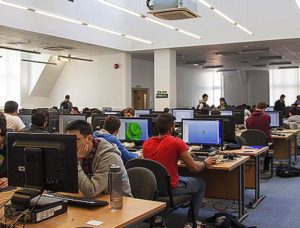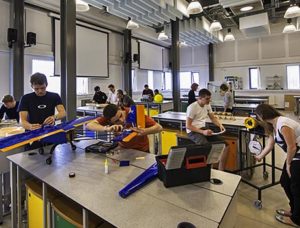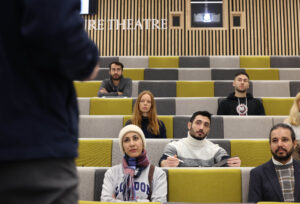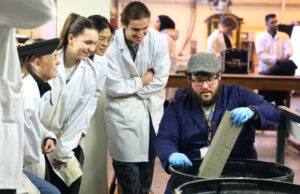Architectural Engineering
UCAS code HK28
- Study mode
- Full-time
- Duration
- 4 years
- Start date and application deadlines
-
- Start date
UCAS code HK28
Architectural Engineering is for students who wish to work at the intersection of architecture and structural engineering. Students develop a multidisciplinary skill set to design building structures and components of critical infrastructure. This includes learning about the technical, societal, historical, economic and environmental aspects needed to manage complex systems in the built environment.
The Architectural Engineering degree is a multidisciplinary degree, encompassing civil engineering and architecture jointly delivered by the School of Engineering and the School of Architecture.
The MEng is a four year integrated Master’s degree developed to fast-track our graduates to become Chartered Engineers with the Institution of Civil Engineers, Institution of Structural Engineers, Institution of Highways Engineers, Chartered Institution of Highways & Transportation and the Permanent Way Institution.
Architectural engineers are responsible for the design of different systems within a building or an aspect of critical infrastructure with a particular focus on key areas.
As a student, you will be provided with a multidisciplinary skill set to design building structures, bridges and critical infrastructure incorporating both the solid technical grounding that a typical civil/structural engineering degree provides; alongside a robust and wider appreciation of the architectural, societal, economic and environmental aspects associated to a particular design solution.
This programme also has a year abroad option, an incredible opportunity to spend an academic year at one of our partner universities. On the 4-year integrated master’s programme, you can go abroad either between Year 2 and 3 (apply in Year 2) OR Year 3 and 4 (apply in Year 3).
This degree is accredited by the Joint Board of Moderators (JBM) comprising the Institution of Civil Engineers, Institution of Structural Engineers, Institute of Highway Engineers, the Chartered Institution of Highways and Transportation and the Permanent Way Institution on behalf of the Engineering Council for the purposes of fully meeting the academic requirement for registration as a Chartered Engineer (CEng).
See www.jbm.org.uk for further information.

These programmes are accredited by the Joint Board of Moderators, which represents five major civil engineering institutions and accredits civil engineering programmes on behalf of the Engineering Council, which sets and maintains the standards for the engineering profession in the UK. The MEng degree is accredited as fully satisfying the educational base for a Chartered Engineer (CEng). The BEng degree is accredited as: (i) fully satisfying the educational base for an Incorporated Engineer (IEng) and (ii) partially satisfying the educational base for a Chartered Engineer (CEng). A programme of accredited further learning will be required to complete the educational base for CEng. See jbm.org.uk for further information and details of further learning programmes for CEng.

We’re proud to announce we’ve been awarded a Gold rating for educational excellence.
Discover what you'll learn, what you'll study, and how you'll be taught and assessed.
Programme details and modules listed are illustrative only and subject to change.
During year two, you will have a week of real, hands-on construction experience at ‘The Constructionarium’. The Constructionarium takes place at a six-hectare site, specifically designed and built to provide a range of challenging teaching and learning conditions for students.
Programme details and modules listed are illustrative only and subject to change.
The programme gives you the opportunity to undertake an individual research project in year three. Teaching staff offer projects based on their research expertise.
Programme details and modules listed are illustrative only and subject to change.
During year four of your degree programme you will solidify your knowledge with a range of advanced modules.
Programme details and modules listed are illustrative only and subject to change.
We are leading the UK’s involvement in the international Conceive-Design-Implement-Operate (CDIO) initiative – an innovative educational framework for producing the next generation of engineers.
Our degree programmes encompass the development of a holistic, systems approach to engineering. Technical knowledge and skills are complemented by a sound appreciation of the life-cycle processes involved in engineering and an awareness of the ethical, safety, environmental, economic, and social considerations involved in practicing as a professional engineer.
You will be taught through a combination of face-to-face teaching in group lectures, laboratory sessions, tutorials, and seminars. Our programmes include a substantial practical component, with an increasing emphasis on project work as you progress through to the final year. You will be supported throughout by an individual academic adviser.
Assessment takes many forms, each appropriate to the learning outcomes of the particular module studied. The main modes of assessment are coursework and examination. Depending on the modules taken, you may encounter project work, presentations (individual and/or group), and specific tests or tasks focused on solidifying learning outcomes.
We have a distinctive approach to education, the Liverpool Curriculum Framework, which focuses on research-connected teaching, active learning, and authentic assessment to ensure our students graduate as digitally fluent and confident global citizens.
The Liverpool Curriculum framework sets out our distinctive approach to education. Our teaching staff support our students to develop academic knowledge, skills, and understanding alongside our graduate attributes:
Our curriculum is characterised by the three Liverpool Hallmarks:
All this is underpinned by our core value of inclusivity and commitment to providing a curriculum that is accessible to all students.
The qualifications and exam results you'll need to apply for this course.
| Qualification | Details |
|---|---|
| A levels |
BBC (including Mathematics: B) |
| BTEC Level 3 national extended diploma |
DDM and Mathematics grade B at A Level. |
| BTEC combinations |
BTEC National Diploma DM plus B in Mathematics at A level; BTEC National Extended Certificate M plus BB including Mathematics at A level at grade B. |
| Welsh Baccalaureate Advanced |
C in the Welsh Baccalaureate, plus BB at A level to include Mathematics grade B. |
| Access |
Pass relevant Access to HE Diploma with 45 Level 3 credits with 27 at Distinction and 18 at Merit |
Studying with us means you can tailor your degree to suit you. Here's what is available on this course.
University of Liverpool students can choose from an exciting range of study placements at partner universities worldwide.
Immerse yourself in Chinese culture on an optional additional year at Xi'an Jiaotong Liverpool University in stunning Suzhou.
Broaden your world by spending an additional year of study at a partner university abroad following your second year of study.
Spend a summer abroad on a study placement or research project at one of our worldwide partner institutions.
Every student at The University of Liverpool can study a language as part of, or alongside their degree. You can choose:
This course is also available as a three year BEng (Hons) programme.
This degree is jointly delivered by the School of Engineering and the School of Architecture. The School of Engineering has world-class, modern, engineering teaching and learning facilities. Within the School there are traditional lecture theatres as well as teaching laboratories, PC teaching centres, smaller study rooms and one of the University’s largest PC teaching/study rooms with over 160 high-specification workstations with specialist engineering software installed.
The Liverpool School of Architecture benefits from comfortable, well-lit studio, work and seminar/review spaces. We also have IT teaching laboratories and workshops, meeting spaces and excellent office accommodation.






From arrival to alumni, we’re with you all the way:

Want to find out more about student life?
Chat with our student ambassadors and ask any questions you have.
Our research-led teaching ensures that we incorporate the latest advances in cutting-edge engineering research. As well as achieving a degree qualification, you will graduate as an industry-ready engineer who has both practical experience and highly desirable skills to the engineering industry.
Studying this course will expose you to maximum opportunities for career prospects, graduate opportunities, and student summer placements specifically during the annual engineering careers fair with 30 blue chip companies attending (including Jaguar Land Rover, Nestle, Toyota, JCB, British Army, United Utilities, ABB Ltd, Network Rail, BAE Systems and many more).
Typical routes/roles available to graduates:
4 in 5 of our engineering students find their main activity after graduation meaningful.
(Graduate Outcomes, 2018-19.)
Your tuition fees, funding your studies, and other costs to consider.
Full-time place, per year - £9,535
Year abroad fee - £1,430 (applies to year in China)
Full-time place, per year - £29,100
Year abroad fee - £14,550 (applies to year in China)
The tuition fees shown are correct for 2025/26 entry. Please note that the year abroad fee also applies to the year in China.
Tuition fees cover the cost of your teaching and assessment, operating facilities such as libraries, IT equipment, and access to academic and personal support. Learn more about paying for your studies.
We understand that budgeting for your time at university is important, and we want to make sure you understand any course-related costs that are not covered by your tuition fee. This includes a lab coat, safety boots, and a residential construction course.
Students should expect to cover the following costs:
Lab coats
Students are required to wear a lab coat for all Engineering laboratory sessions. Students may purchase a lab coat at the start of the year from the Student Support Office at a subsidised cost of £15.
Safety boots
Students will be required to wear safety shoes or boots (with both toe cap and midsole protection conforming to European safety legislation) for some activities. Boots must be provided by the students.
Other safety equipment.
All essential safety equipment, other than those listed above, is provided free of charge by the department.
The ‘Constructionarium’
During year two, you will have a week of residential, hands-on construction experience at ‘The Constructionarium’. There is an additional cost of up to £250 for the Constructionarium.
We offer a range of scholarships and bursaries that could help pay your tuition and living expenses.
If you’re a UK student joining an undergraduate degree and have a household income below £35,000, you could be eligible for a Liverpool Bursary worth up to £2,000 for each year of undergraduate study.
Apply for an Asylum Seekers Scholarship and you could have your tuition fees paid in full and receive help with study costs. You’ll need to have applied for asylum in the UK, or be the dependant of an asylum seeker, and be joining an eligible undergraduate degree.
If you’ve spent 13 or more weeks in Local Authority care since age 14, you could be eligible for a bursary of £3,000 per year of study. You’ll need to be a UK student joining an eligible undergraduate degree and be aged 28 or above on 1 September in the year you start.
Are you a UK student with a Black African or Caribbean heritage and a household income of £25,000 or less? You could be eligible to apply for a Cowrie Foundation Scholarship worth up to £8,000 for each year of undergraduate study.
If you’re a UK student identified as estranged by Student Finance England (or the equivalent UK funding body), you could be eligible for a bursary of £1,000 for each year of undergraduate study.
Joining a School of Biosciences degree and have a household income of less than £25,000? If you’re a UK student, you could apply to receive £4,500 per year for three years of your undergraduate course.
Do you live in the Liverpool City Region with a household income of £25,000 or less? Did neither of your parents attend University? You could be eligible to apply for a Nolan Scholarship worth £5,000 per year for three years of undergraduate study.
Are you a UK student with a household income of £25,000 or less? If you’ve participated in an eligible outreach programme, you could be eligible to apply for a Rigby Enterprise Award worth £5,000 per year for three years of your undergraduate degree.
Are you a UK student with a household income of £25,000 or less? Did neither of your parents attend University? You could be eligible to apply for a ROLABOTIC Scholarship worth £4,500 for each year of your undergraduate degree.
Apply to receive tailored training support to enhance your sporting performance. Our athlete support package includes a range of benefits, from bespoke strength and conditioning training to physiotherapy sessions and one-to-one nutritional advice.
Joining a degree in the School of Electrical Engineering, Electronics and Computer Science? If you’re a UK student with household income below £25,000, you could be eligible to apply for £5,000 a year for three years of study. Two awards will be available per academic year.
If you’re a young adult and a registered carer in the UK, you might be eligible for a £1,000 bursary for each year of study. You’ll need to be aged 18-25 on 1 September in the year you start your undergraduate degree.
Use our handy chatbot for your Clearing enquiries.
Last updated 17 June 2025 / / Programme terms and conditions